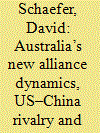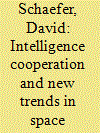| Srl | Item |
| 1 |
ID:
160371


|
|
|
|
|
| Summary/Abstract |
Canberra’s exposure to great-power conflict is arguably more complex and ambiguous than during the Cold War. Drawing from scholarly literature on entrapment and recent developments in outer-space security, this article explores Australia’s position in a hypothetical US–China war over Taiwan. The shifting military balance in outer space, recent war games by the US military and regional trends in defence planning all raise the possibility of a scenario opening with Chinese cyberattacks against information networks shared between Australia and the USA. As a result of its growing dependency on space systems, Australia may be entrapped in a novel way which poses questions for scholars and policymakers. These findings should encourage further study of regional crisis management, with the need for a shared understanding of strategic behaviour in outer space and cybernetworks.
|
|
|
|
|
|
|
|
|
|
|
|
|
|
|
|
| 2 |
ID:
160464


|
|
|
|
|
| Summary/Abstract |
For the first time since the 1970s, Canberra cannot assume the joint facilities will continue to underpin the Australia–US alliance. Intelligence cooperation via outer space, described as the ‘strategic essence’ of this relationship, is poised for transformation. New technologies are being developed for satellite communication, with laser systems capable of bypassing ground control stations outside US territory. As a result, the one indispensable role for Australia in US national security—hosting infrastructure to relay intelligence about nuclear and missile activity—could become irrelevant in the years ahead. With questions raised about the Trump administration’s commitment to security partners and the risk of US disengagement from Asia, these findings have implications for Australian alliance diplomacy. If intelligence ties bind these countries together at present, Canberra can expect some risk of loosening in the future and will need to think carefully about the development of national intelligence resources over the long term.
|
|
|
|
|
|
|
|
|
|
|
|
|
|
|
|